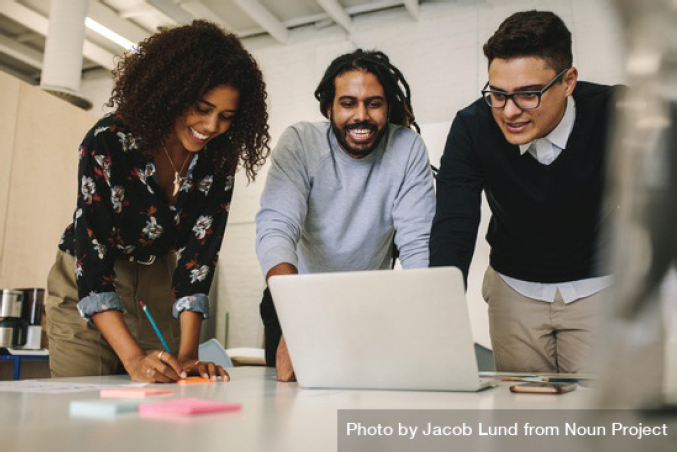14. Workforce Innovation and Development Institute
Dr Jessica Lee-Ack

About the Workforce Innovation and Development Institute
The social service sector is Australia’s largest and fastest growing industry and provides vital services to support the health, safety and wellbeing of our communities. This sector is also undergoing significant change with the introduction of new funding and service models like the National Disability Insurance Scheme (NDIS) and significant reforms arising from a series of Royal Commissions into areas such as family violence, aged care and disability. As noted by Royal Commissioners, peak bodies and people who access social services, a high quality, well trained and valued social service workforce is arguably the most important factor contributing to positive outcomes for service users.
It was the recognition of the critical role of the social service workforce that led to the formation of the Institute in 2016. Established as a partnership between RMIT University and the Victorian Council of Social Service (VCOSS), the Institute drives innovation in education, training and applied research to enable the growth and transformation of the social service sector. Formerly known as the Future Social Service Institute (FSSI) the Institute was initially supported by funding from ‘Keeping Our Sector Strong: Victoria’s Workforce Plan for the NDIS’ (Department of Health and Human Services 2021). Over the past five years the Institute has worked closely with partners from across the sector to develop a portfolio of projects that support our vision for ‘a strong community, supported by a diverse, high quality, responsive and innovative social service sector’. Workforce Innovation and Development Institute (WIDI) creates impact in the following domains:
|
We work to improve curriculum, both accredited and unaccredited, to drive engagement, work readiness and capability. |
We co-design and scale up new pathways to support industry to meet current and future sector challenges in their delivery of social services. Our completion rates double industry averages. |
We create innovative training solutions and enhance leadership capability, equipping workers to drive transformational improvement across social service delivery sectors. |
We build the evidence base on workforce needs and solutions and support job creation, and develop sustainable, long-term pipelines of workers across the social service sector. |

Image 22 The Noun Project open photo: https://thenounproject.com/photo/creative-businesspeople-working-together-as-a-team-5XQoV4/ Creative Businesspeople Working Together As A Team by Jacob Lund Photography from NounProject.com
WIDI’s work spans design and delivery of new education pathways, leadership development, evaluation and applied research. WIDI works in partnership with the sector and Government to identify key workforce challenges and develop, test and refine innovative responses to these challenges.
WIDI Placements Model
WIDI began hosting social work placement students in September 2020 with WIDI providing task supervision and RMIT’s School of Global, Urban and Social Studies providing Field Work Supervision. In contrast to many agencies, WIDI was well positioned to host students during the Covid-19 pandemic when placements transitioned from on-site to remote arrangements. At this time, the entire WIDI team had been working remotely for six months and had instituted a range of measures to support team functioning and wellbeing. These measures included a daily virtual Community Meeting based on the Sanctuary Model of trauma informed care, consolidation of Project Teams focusing on delivering specific workstreams and adaptation of project plans in line with public health measures, virtual one-on-one catch ups to stay connected and the introduction of a weekly social activity, a quiz held on Thursday afternoons. As part of RMIT, the Institute was also able to access to a range of services offered to support staff wellbeing during the pandemic.
WIDI developed a model to support student placements, which includes the following components:
- Student Learning Groups – students are typically set up as pairs or groups of three working on a specific project so that they can work together and support each other throughout the placement;
- “Team within a Team” – students form a “Team within the Team” and self-organise to engage with and support each other throughout the placement;
- Project Teams – each group of students forms a Project Team with their Task Supervisor and other relevant members of the WIDI Team and Project Teams meet regularly to plan and implement the project;
- Induction Program – in the first week students meet with their Task Supervisor and other members of the WIDI Team who provide an overview of the Institute’s work, explain the team routines/ways of working and discuss any queries that the students may have;
- Community Meeting – students take part in WIDI’s “Community Meeting” every morning – the Community Meeting is based on trauma informed practice, the brief meeting (generally 10 – 15 minutes) begins with an Acknowledgement of Country (rotated among the Team) and includes three questions:
- 1) how are you feeling today?
- 2) what is your goal for the day?
- 3) an ice-breaker question posed by the person who gave the Acknowledgement of Country.
- Development Opportunities – Task Supervisors and other WIDI Team members share details of relevant events and training opportunities that may be of interest and students choose which opportunities to engage in based on their interests and learning goals;
- Buddies – each student is assigned a “WIDI Buddy”, a member of the WIDI Team who can provide advice and support throughout the placement;
- “Coffee Roulette” – students are encouraged to connect with each member of the team over the course of their placement;
- WIDI Quiz – students take part in WIDI’s online quiz which is held on Thursday afternoons;
- Email and System Access – students are set up as non-salaried staff members access to relevant software and systems and an email address with WIDI email signature; and
- Website Profiles – students are invited to submit a biography and photo to be featured on the WIDI website.
Prior to the commencement of the first group of students in September 2020, WIDI undertook the following activities:
- Documenting the student placement model and briefing the WIDI Team on the model;
- Placing students into pairs or groups of three and assigning them to specific projects based on areas of interest;
- Matching students to Buddies from the WIDI Team;
- Requesting non-salaried staff email and system access for students;
- Creating a dedicated Microsoft Team Site to share key documents;
- Scheduling induction meetings including “Welcome Meeting” on day 1 and initial Project Team meeting;
- Developing a “Meeting schedule and FAQs” document including:
- An overview of the WIDI placements model;
- Meeting schedule;
- A Coffee Roulette schedule;
- Frequently Asked Questions;
- Activities and Upcoming Events page; and
- WIDI Contacts;
- Emailing placement students with information about their placement and links to key documents.

Image 23 The Noun Project open photo: https://thenounproject.com/photo/young-woman-entrepreneur-taking-notes-during-discussion-with-colleagues-in-office-0v8Dd4/ Young Woman Entrepreneur Taking Notes During Discussion With Colleagues In Office by Jacob Lund Photography from NounProject.com
Placement Student Projects – Semester 2 2020
In Semester 2 2020, WIDI hosted eight placement students, four groups of two students. These were remote placements due to public health measures in place in Victoria between September and November 2020. Three of the groups undertook literature reviews on specific topics (disability workforce, peer workforce and integrated practice) and three of the groups also contributed to WIDI evaluation projects.
|
Group 1 |
• Project 1: Literature review on disability workforce • Project 2: Evaluation of Family Violence Leadership Intensive Program |
|
Group 2 |
• Project 1: Literature review on the peer workforce • Project 2: Evaluation of Family Violence Leadership Intensive Program |
|
Group 3 |
• Project 1: Literature review on integrated practice |
|
Group 4 |
• Project 1: Evaluation of Council to Homeless Person’s internship program |
Placement students undertook a range of activities including:
- Sourcing and analysing academic and grey literature;
- Designing and implementing data collection methodologies;
- Data collection including designing and undertaking interviews;
- Analysis and synthesis of data; and
- Preparing and presenting reports.
The literature reviews undertaken by placement students in Semester 2 2020 helped to inform WIDI’s thinking about key workforce issues and challenges such as:
- Defining the workforce including the disability workforce and the peer workforce;
- Identifying the inherent requirements for disability support work;
- The role of the peer workforce and the benefits and challenges of peer work; and
- Types of integrated practice models.
The evaluation activities undertaken by placement students contributed to WIDI’s understanding of:
- The impact of the 2020 Leadership Intensive Program – a non-accredited program for leaders in the family violence sector funded by Family Safety Victoria; and
- The outcomes of the Council to Homeless Person’s internship program.
Placement Student Projects – Semester 1 2021
In Semester 1 2021, WIDI hosted four placement students. These began as remote placements in February however students were able to come on-site on several occasions between March and May 2021 when public health measures were eased and RMIT campuses opened to a broader range of students and staff. Three of the students worked on a project exploring retention and career progression of leaders in the family violence sector and the fourth student undertook a literature review on workforce data for the social service sector.
|
Group 1 |
• Project 1: Research project on retention and career progression among past participants of WIDI’s Leadership Intensive Program (Leadership Journeys Project) |
|
Group 2 |
• Project 1: Literature review on social service workforce data |
Placement students undertook a range of activities including:
- Developing project plans;
- Designing research methodology;
- Developing an ethics proposal;
- Designing data collection tools and approaches (surveys and interviews);
- Consulting with external stakeholders on key aspects of the research design;
- Collecting, analysing and synthesising data; and
- Preparing reports.
The Family Violence Leadership Journeys Project designed and implemented by placement students in Semester 1 2021 has deepened WIDI’s understanding of the factors contributing to retention and career progression among leaders in the family violence sector.
The literature review – which was part of a project sponsored by the Council to Homeless Persons – examined existing workforce data sets from across the social service sector identifying intersections and gaps in the data.
RMIT Support
As noted above, under the WIDI Placements Model WIDI provides task supervision and Field Work Supervision is provided by RMIT’s School of Global, Urban and Social Studies (GUSS). Prior to the first cohort of placement students, WIDI’s Director and Deputy Director met with leaders from the GUSS Social Work Professional Practice Unit in July 2020 to discuss potential placements to ensure that the WIDI projects would align with the program requirements.
The GUSS Work Integrated Learning (WIL) Team supported WIDI to connect with students who had been matched to WIDI and their Field Education Supervisor, complete paperwork associated with placement and access information and resources where needed. As part of RMIT, WIDI has a good understanding of RMIT systems and processes and was able to navigate these with minimal assistance to support students on placement.

